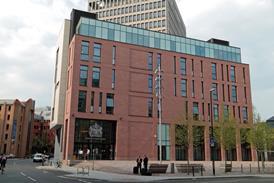Family lawyers will be expected to come to court with their laptops and draft orders on the day as part of a policy drafted to reduce delays caused by growing workloads and dwindling staff resources. The court orders policy came into force at London's Central Family Court last week.
The policy, signed by His Honour Judge Robin Tolson QC, the court's designated family judge, states that the background 'is an environment of significantly increasing caseloads and reduced staff resources, with consequent delays in drawing up of orders by the court'.
It applies to non-financial remedy cases where at least one party is represented. Court orders must be approved by judges, drawn up and handed to the parties on the day of the hearing. The judge can permit a delay but this 'will be the exception and not the rule'.
Orders must be tight in length. Legal representatives will be expected to attend court with a laptop so they can draft an order. Once agreed by all parties, the draft should be emailed to the clerk 'while parties remain at court'.
After the judge approves the order, the clerk will draw it up, print and hand it to the parties on the same day as the hearing or email the order if email addresses have been provided.
If the case finishes by 1pm, the order must be lodged by 4.30pm. If the case finishes in the afternoon, the order must be lodged by 10am the next day. Cases may be listed for mention if an order is not received on time. The judge or legal adviser will draft the order on the day of the hearing for cases involving litigants in person.
The policy says: 'Judges, magistrates, legal advisers and staff at [Central Family Court] remain highly appreciative of the work done by legal professionals in the drafting of orders and are sensitive to the time which this takes up.'
Barrister Ramanjit Kang, of Coram Chambers in London, told the Gazette that judges and magistrates have a statutory duty in family cases to draw up an order reflecting the court's decision following a hearing.
'It has been the convention in the family courts for a while now that the lawyers draft court orders for the court’s approval,' she explained. 'It is usually the lawyer for the applicant that takes the lead and produces a first draft. In cases where one party is not represented the court expects the lawyer for the represented party to produce a draft order. The process of creating a draft order is often done over email over the course of two or three days.'
Kang said the policy will improve efficiency, but warned that it will extend the court day, which could affect those who have other commitments such as childcare. 'Also, the prospect of hanging around court is inevitably going to increase costs, either to the Legal Aid Agency or a privately paying client,' she warned.

















![David Lester (senior partner at Blythe Liggins), Darryl Barnes, Jagdeep Sandher (head of dispute resolution at Blythe Liggins)[4]](https://d1d8vslyhr7rdg.cloudfront.net/Pictures/274x183/4/2/8/116428_davidlesterseniorpartneratblytheligginsdarrylbarnesjagdeepsandherheadofdisputeresolutionatblytheliggins4_981603_crop.jpg)






11 Readers' comments